The first televised presidential debate occurred in 1960 between Senators John Kennedy (D-Mass.) and Richard Nixon (R-Calif.). But the first vice presidential debate didn’t occur until 16 years later in 1976. In those 16 years, two vice presidents became presidents: the first, Lyndon B. Johnson, as the result of the assassination of President Kennedy and the second, Gerald Ford, as the result of the resignation of Richard Nixon. Suddenly, people wanted to know more about the vice presidential candidates, and today, the VP debate is a fixture of the presidential year.
Whether this year’s debate between Sen. J.D. Vance (R-Ohio) and Minnesota Governor Tim Walz will matter is a question we will soon find out. But a review of the history of these debates finds that it’s hard to assess whether they matter or not.
The first vice presidential debate was between Sen. Robert Dole (R-Kan.) and Sen. Walter Mondale (D-Minn.). Dole attacked the Democrats on crime— “If we added up the killed and wounded in Democrat wars in this century, it would be…enough to fill the city of Detroit.” In response, Mondale said Dole lived up to his reputation as a “hatchet man” for implying that major wars such as World War II (in which ironically Dole was a hero) were fought only at the whim of Democratic politicians. Jimmy Carter and Walter Mondale won that election, but no one really thinks the VP debate made much difference.
The next vice presidential debate was in 1984, and it attracted a huge viewership since it involved the first woman vice presidential candidate, Rep. Geraldine Ferraro (D-N.Y.) versus Vice President George H.W. Bush. Bush referred to Ferraro as “Mrs.” instead of “congresswoman” and later added “This is serious business, but let me help you, Mrs. Ferraro…” Ferraro shot back with: “Let me just say, first of all, that I almost resent, Vice President Bush, your patronizing attitude that you have to teach me about foreign policy.” The audience erupted in spontaneous applause. “I have been a member of Congress for six years,” Ferraro continued, “I was there when the embassy was held hostage in Iran. I have been there, and I have seen what has happened in the past several months, 17 months with your administration.” The debate sensitized male politicians to the dangers of debating a woman and seeming to talk down to her. Nonetheless Reagan and Bush won the election in a landslide.
In 1988, curious voters tuned into the debate between Sen. Dan Quayle (R-Ind.) and Sen. Lloyd Bentsen (D-Texas). From the moment he bounded onto the stage at the Republican convention in New Orleans, Dan Quayle’s qualifications for office and his intelligence had been questioned. Quayle, trying to counter his image as a lightweight, invoked his youth, comparing himself to President Kennedy who had served the same amount of time in Congress as Quayle. But Bentsen was ready with a killer line: “Senator, I served with Jack Kennedy. I knew Jack Kennedy. Jack Kennedy was a friend of mine. Senator, you’re no Jack Kennedy.” Polls and pundits alike declared Bentsen the winner, but nonetheless, in November, the Bush-Quayle ticket won a solid victory over the Dukakis-Bentsen ticket.
The 1992 presidential race featured Gov. Bill Clinton (D-Ark.) versus President George H.W. Bush and a strong third-party candidate, the billionaire Ross Perot. That vice presidential debate is remembered not for the performance of Senator Al Gore (D-Tenn.) or for the performance of Vice President Dan Quayle but for the poor performance of Perot’s running mate, Admiral James Stockdale. Stockdale, who had had an impressive career in the military and in academia turned in one of the poorest performances ever in a debate. His opening line—“Who am I, why am I here?” became the butt of many jokes due to Stockdale’s weak and often confused demeanor on the debate stage. But it didn’t keep Perot from earning 19% of the vote, making him the most successful third-party candidate in U.S. history.
In 1996, Al Gore was the sitting vice president and he was running against former Rep. Jack Kemp (R-N.Y.), the Republican vice presidential nominee on Bob Dole’s ticket. The debate was regarded by all as very civil; Kemp did not use it to comment on President Clinton’s character, and Gore put in a strong performance. The Clinton-Gore ticket won.
The 2000 presidential election featured no sitting vice president. The Republican vice presidential candidate, former Rep. Dick Cheney (R-Wyo.), George Bush’s running mate, debated Al Gore’s running mate Sen. Joe Lieberman (D-Conn.). It too was a civilized and respectful debate. No one quotes any zingers from that debate, and it seemed to not have an influence on the overall race which ended up in a tie going all the way to the Supreme Court—and essentially made George W. Bush the winner.
By the time of the 2004 debate between sitting Vice President Dick Cheney and Democratic Sen. John Edwards (D-N.C.), the civil tone of the previous two debates had disappeared. In front of a large audience of voters focused on the Iraq invasion, the economy, and the new issue of gay marriage, Cheney sought to highlight how inexperienced Edwards was—saying: “The first time I met you was when you walked on the stage tonight.” Edwards asked Cheney if he was “… willing to talk about the fact that [Cheney and his wife Lynne] have a gay daughter?” All in all, the VP debate didn’t seem to matter much—Bush and Cheney won reelection.
The 2008 presidential election featured the second woman to be nominated for vice president—Gov. Sarah Palin of Alaska who ran with Sen. John McCain (R-Ariz.) on the Republican ticket. She faced Senator Joe Biden (D-Del.) who was Sen. Barack Obama’s (D-Ill.) running mate. Nielsen Media Research stated it was watched by 70 million viewers—making it the most watched VP debate in history. By the time of the debate (October 2, 2008), Palin’s star had started to fade. On September 24 and 25, she had sat for in depth interviews with NBC anchor Katie Couric. Her inability to answer questions showed a stunning shallowness of her knowledge of things a would-be president should know and became fodder to late night television jokes. Biden, for his part, avoided talking down to Palin (as Bush before him had done to Ferraro) and showed great policy depth; in a-CNN Poll: 46% of watchers said Palin was qualified to be president, compared to 87% who said Biden was qualified. Palin’s vice presidential candidacy may be the one that contradicts the conventional wisdom. Political scientists found that her negative effect on the vote choice “was the largest of any vice presidential candidate in elections examined dating back to 1980.” The Obama-Biden ticket won a solid victory in November.
By the 2012 vice presidential debate, Barack Obama was president, Joe Biden was vice president, and they were running against former Utah Gov. Mitt Romney and his running mate, Rep, Paul Ryan (R-Wis.). This debate followed the first presidential debate in which Romney performed better than President Obama. The Obama campaign needed a boost and Joe Biden’s aggressive performance gave it that. While there were no famous one-liners, Biden attacked in his familiar folksy way— “With all due respect, that’s a bunch of malarkey. Not a single thing he said is accurate,” which helped put new energy into the Obama campaign.
In 2016, Hillary Clinton ran against Donald Trump, setting up a VP debate between Sen. Tim Kaine (D-Va.) versus Gov. Mike Pence (R-Ind.). Gone were the days of civil debates. In fact, Kaine and Pence constantly interrupted each other, frustrating viewers and leading MSNBC’s Rachel Maddow to declare the debate was “incomprehensible” due to the number of times the candidates interrupted each other. But it didn’t seem to make any difference in the outcome—Trump won an electoral college victory and became president.
The 2020 VP debate was held in the midst of the COVID-19 pandemic. Pence and Harris stood 12 feet apart with a plexiglass wall in between them. In a preview of the issue that would become paramount three years later, both candidates were asked if they had discussed procedures about “presidential disability” with their running mates, given that Biden and Trump were both old. Neither answered the question directly. A CNN poll found that 59% of viewers thought Harris had won, while 39% said Pence did. And Ipso’s KnowledgePanel found that while the debate didn’t really change how people were planning to vote, Harris did improve her favorability ratings.
As we can see—it’s hard to judge the impact of vice presidential debates. They tend to blend into the overall narrative of the race. Dole came off as a “hatchet man,” and Quayle and Palin came off as not quite ready for prime time. Overall, with the exception (perhaps) of Sarah Palin, political scientists have concluded that vice presidential debates in general don’t have much of an effect on presidential elections.
But the debate between Vance and Walz is occurring in a race that is razor thin. With very few votes deciding the outcome, anything—including the vice presidential debate—could matter, which is why we will be watching.
The Brookings Institution is committed to quality, independence, and impact.
We are supported by a diverse array of funders. In line with our values and policies, each Brookings publication represents the sole views of its author(s).
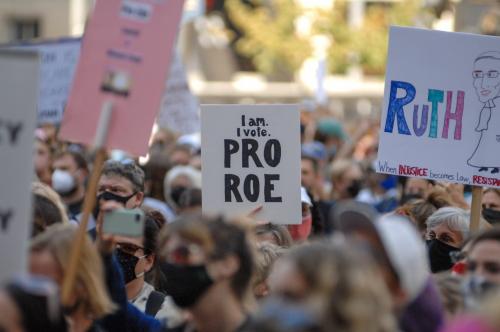

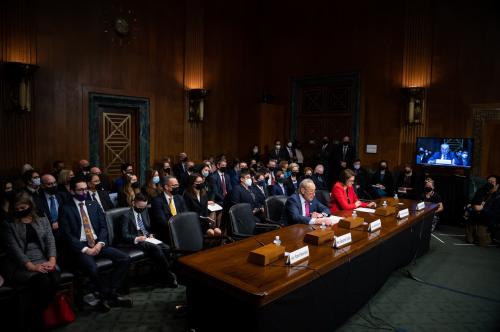

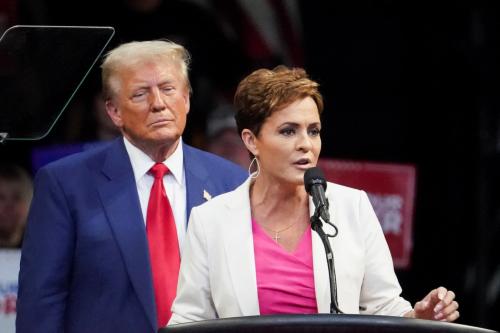
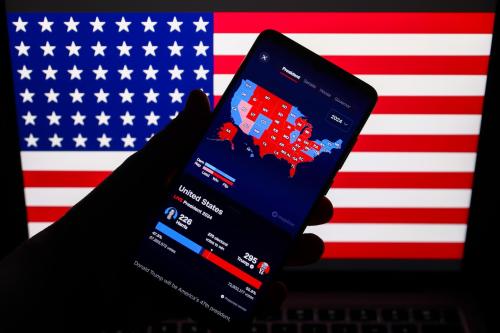
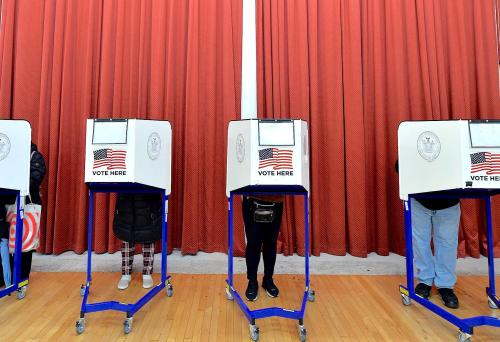
Commentary
Will the vice presidential debate matter? A review of the modern debates
September 30, 2024